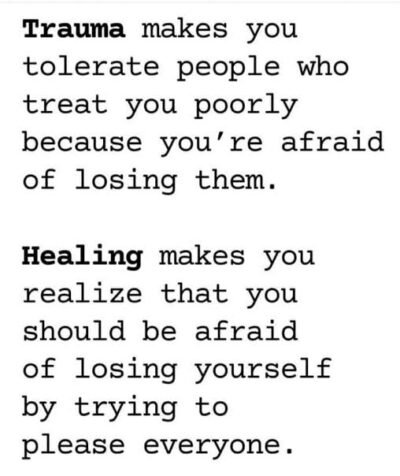Self-abandonment is one of the most overlooked consequences of surviving abuse, harassment, or assault.It’s what happens when you learn—often in order
 Self-abandonment is one of the most overlooked consequences of surviving abuse, harassment, or assault.
Self-abandonment is one of the most overlooked consequences of surviving abuse, harassment, or assault.
It’s what happens when you learn—often in order to survive (poverty, abuse, violence, racism, sexism, misogyny, disability)—that your needs, voice, or pain must come last.
For many Survivors, self-abandonment feels normal.
You push through exhaustion. You silence your gut feelings.
You stay in spaces that don’t feel safe because you were taught that your safety isn’t a priority.
But here’s the truth:
You can learn to come home to yourself.
And it starts with naming how you’ve been taught to leave yourself behind.
What Is Self-Abandonment?
Self-abandonment is when you disconnect from your needs, emotions, body, or voice to stay safe, accepted, or in control.
It often begins as a survival strategy—but becomes a form of self-harm when it continues long after the threat is gone.
What Self-Abandonment Can Look Like
It isn’t always loud or obvious.
Self-abandonment can wear the mask of “strength,” “being easygoing,” or “not making a big deal.”
It can look like:
Saying “yes” when you mean “no”
Minimizing or rationalizing emotional, physical, or sexual harm
Staying in unsafe relationships, jobs, or environments out of guilt or fear
Ignoring your own need for safety
Delaying leaving dangerous situations until it’s nearly too late
Underestimating the danger of certain people or environments
Overestimating your ability to calm or control dangerous situations
Silencing your intuition in favor of what seems polite, peaceful, or logical
Believing that love requires suffering
Pushing through exhaustion, illness, or anxiety without pause
Trusting the opinions of others more than your own
Believing your trauma “wasn’t that bad” or that your healing is taking too long
Safety plays a huge role in self-abandonment.
And here’s the part that often goes unspoken:
Abusers know it.
They exploit your silence.
They test your boundaries.
They count on the fact that you’ll second-guess yourself, delay leaving, or take responsibility for the harm they cause.
Why Survivors Abandon Themselves
Self-abandonment is taught, modeled, and sometimes demanded.
Many Survivors were conditioned to believe:
Being “difficult” means being unlovable
Safety is something you earn, not something you deserve
Conflict must be avoided—even if it costs your peace
Your body and boundaries are negotiable
Expressing needs makes you a burden
When you’ve been hurt before, especially by people you trusted, it can feel safer to disconnect from yourself than to risk being rejected, punished, or hurt again.
How to Begin Coming Back to Yourself
Healing from self-abandonment doesn’t require perfection.
It requires presence. Grace. And the willingness to return to your own side.
Here are gentle but powerful steps to begin the return:
1. Acknowledge Your Needs—Especially the Ones You’ve Been Ignoring
Your need for safety is not negotiable. Name it. Honor it.
2. Tune In to Your Body
Your body remembers. Begin noticing where it tightens, tenses, or trembles. That’s information—not weakness.
3. Believe Your Intuition
You don’t have to explain it. If it feels wrong, that’s enough. You are allowed to leave before it escalates.
4. Interrupt the Inner Critic
When the voice in your head sounds like your harm-doer, interrupt it. Replace it with compassion: “I deserve safety, not silence.”
5. Make Safety a Priority—Not an Afterthought
You don’t have to be in crisis to seek safety. You are allowed to leave the moment something doesn’t feel right.
Healing From Trauma Means Coming Home
You deserve a life where your safety is not debated.
You deserve relationships where your boundaries are honored—not tested.
You deserve peace that doesn’t come with a cost.
You deserve rest without guilt, healing without apology, and love without harm.
Coming home to yourself means standing on your own side—again and again.
Even when it’s hard.
Especially when it’s hard.
Final Word: You’re Allowed to Return
You don’t owe anyone your silence.
You don’t have to “earn” your own protection.
And you don’t have to keep proving how strong you are by staying in places that hurt.
Coming back to yourself is not selfish—it’s survival done differently.
This time, you get to save yourself without shame.
Come back.
Gently.
Completely.
Without delay.
